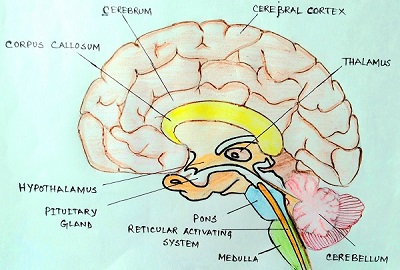What is Nervous System?
Human brain is the main part of nervous system which is the control center for organ movements, thoughts, feelings, memory and automatic responses to surroundings.
It also controls the other body functions and processes such as digestion, breathing, heart beat, blinking of eyelids and sexual development (puberty) with growth.
Functions of Nervous System
Nervous system acts on every aspect of health such as –
- Brain is responsible for thoughts and imagination, memory power, learning capacity and sense or feelings.
- It controls all body organ movements either voluntary or involuntary movements such as balancing, coordination, reactions and responses.
- Human brain senses, how brain interprets about what we see, hear, taste, touch and feel.
- It affects in sleep, healing and aging.
- Human brain controls Heart beat and breathing patterns.
- It delivers reactions and response to stressful situations.
- Human brain monitors the digestion, as well as hunger and thirsty feelings.
- It controls the body growth processes such as maturity and puberty.
Parts of Nervous System
Our nervous system is consist of a vast network of nerves which transmit electrical signals to and from other cells, glands and muscles all over in body. These nerves receive information from surroundings. Then the nerves interpret the information and control body response.
The main parts of the nervous system are –
Neurons
Nervous system uses specialized cells called neurons. The electrical signals travel between brain, skin, organs, glands and muscles through Neurons.
Different kinds of neurons transmit different signals. Motor neurons send signals to muscles movement. Sensory neurons take information from your senses and send signals to your brain. Other types of neurons control the things the body does automatically like breathing, shivering, having a regular heart beat at constant pace and digesting food.
Central nervous system
Brain and spinal cord make our central nervous system (CNS). Human Brain use nerves to send signals and directions to the rest of body. Each nerve has a protective outer layer called myelin. Myelin insulates the nerve and helps the messages to get through.
Peripheral nervous system
Peripheral nervous system consists of many nerves that branch out from CNS all over in body. This system relays information from brain and spinal cord to organs, arms, legs, fingers and toes. The peripheral nervous system contains –
This controls voluntary movements.
This controls activities of involuntary movements.
Human Brain
Brain is the main part of nervous system. It is a complex organ which controls thought, memory, emotion, touch, training skills, vision, breathing, temperature, hunger and every process that regulates our body. The brain and spinal cord together constitute the central nervous system (CNS).
Various complications that arise due to brain disorders are headache, brain stroke, hematoma or hemorrhage (bleeding in brain), tumor, Glioblastoma, Hydrocephalus, Meningitis, Trauma, Parkinson’s disease, Epilepsy, Alzheimer’s disease etc.
Various brain test are required to be done to detect the disorders in brain such as CT scan (computed tomography), Angiography, Magnetic Resonance Angiography (MRI), Electroencephalogram (EEG) etc.
Anatomy of Human brain is shown in figure.

Disorders in Nervous System
Many disorders and conditions can badly affect the nervous system. An injured or damaged nerve has difficulties in transmission of signals and messages.
Nerve damage can happen in several ways. Some of the most common causes of nerve damage include –
1.Brain Diseases
Many type of infections, cancers and autoimmune diseases like diabetes, lupus and rheumatism or arthritis can cause nervous system problems.
2.Brain Stroke
Brain stroke happens when a blood vessel becomes choked or get accidental damage and thus scarcity of sufficient blood arise in brain and it ceases to function. Damages in blood vessels to brain may happen due to following circumstances –
Accidental injury –
Nerves can get damaged in any accident. Damaged nerves creates many physical abnormalities.
Mechanical Pressure –
By mechanical pressure by bones, a nerve get pressed or compressed. A pressed nerve can not get enough blood work properly. Trapped or pressed nerve may happen due to a tumor or structural problems like spondylitis or sciatica. These are generally happens due to human wrong habits and postures.
Action of Chemicals –
Chemotherapy medicines, illegal drugs, excessive alcohol and poisonous substances can cause brain or nerve damage.
Kidney Diseases –
Some kind of disease cause nerve problems. Kidney disease damage nerves as they work hard in filtering of blood from toxins.
Body Growth –
As human get older, their nervous system slow down. Some people lose sensation in their limbs, fingers, toes or other parts of body.
Supplementary Nutrients for Healthy Brain
Certain diseases, accidents, toxins in blood and natural aging process can damage your nervous system.
Brain is the command center for nervous system of entire body. It needs care to keep working correctly. Everybody should go for regular check up for abnormal blood sugar level and treatment for diabetes. We should eat a healthy & balanced diet, avoid drugs, avoid smoking & alcohol. The best way to avoid nerve damage from disease is to manage conditions that can injure your nerves, such as diabetes.
